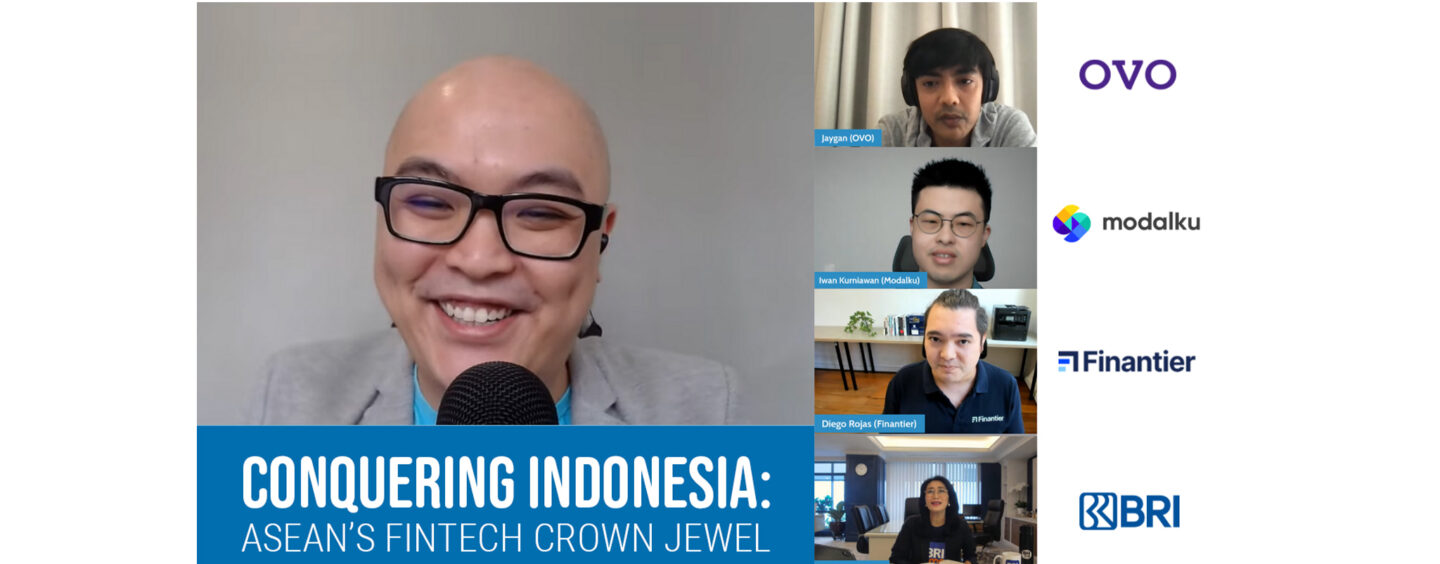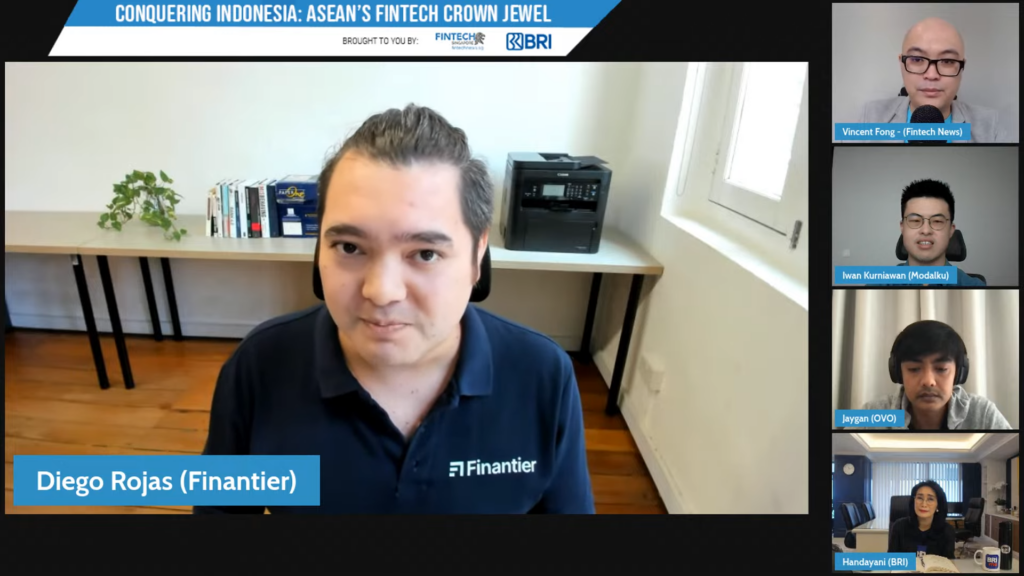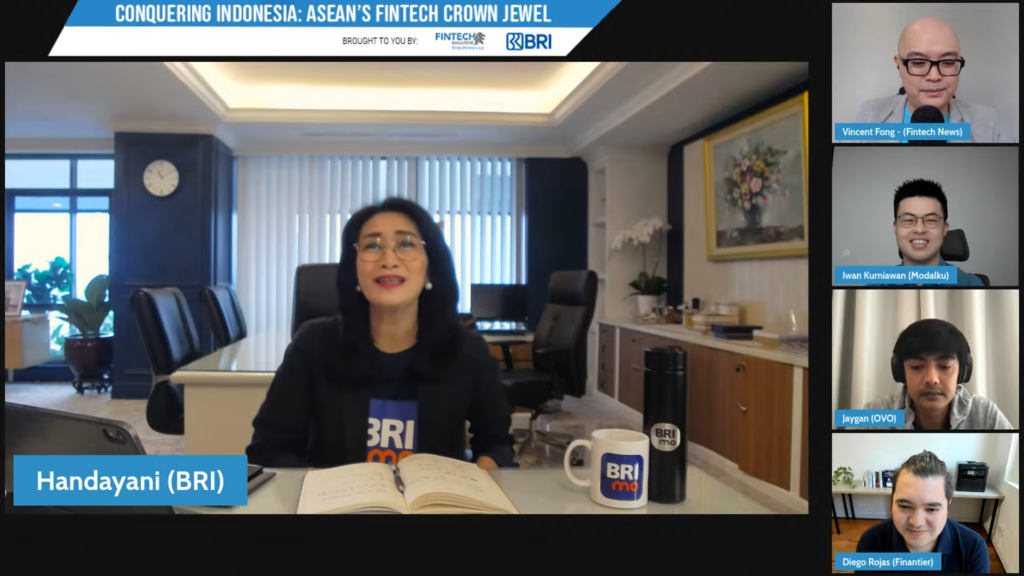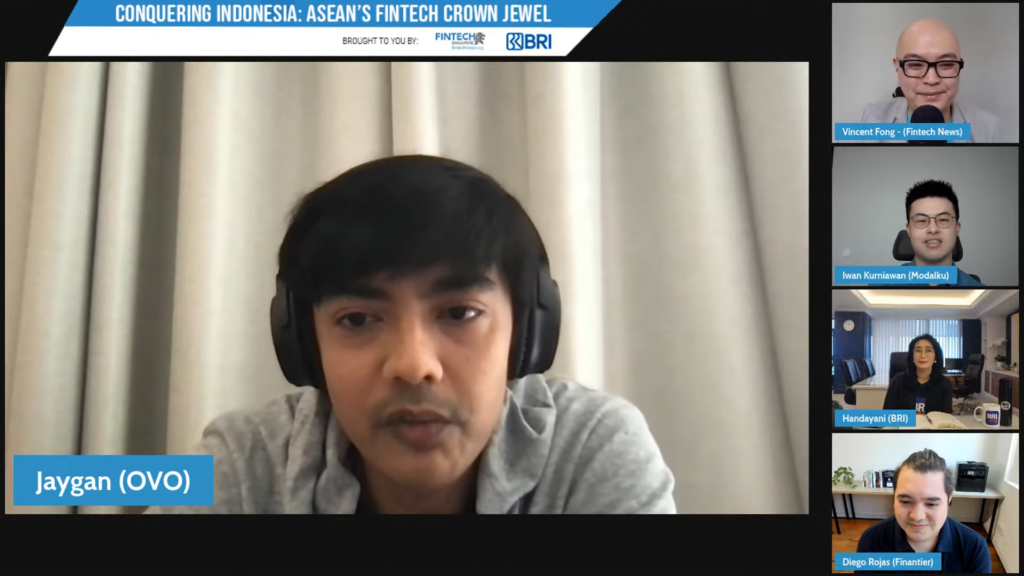
Indonesia: An Insider’s View into ASEAN’s Fintech Crown Jewel
by Fintech News Indonesia October 13, 2021Indonesia’s fintech industry is entering a new era of growth and maturity, triggered by the COVID-19 pandemic, booming venture funding activity, and a proactive regulatory environment that has committed to fostering innovation to help improve financial inclusion, top executives from online lending platform Modalku, open finance startup Finantier, e-wallet OVO, and Bank Rakyat Indonesia (BRI), said during a recent Fintech Fireside Asia virtual panel discussion.

Diego Rojas, Co-Founder & CEO at Finantier
“The pandemic has accelerated the adoption of digital services and services … regulators are providing guidelines for everyone in the ecosystem … and [fellow] fintechs are becoming unicorns,” said Diego Rojas, Co-Founder, and CEO of Finantier.
“We see all of this converging … and paving the way for a new wave of innovation not just in Indonesia but also the region.”
Fintech startups like Finantier, OVO and Modalku have been riding the momentum induced by the COVID-19 pandemic, enjoying a massive influx of consumers moving onto online channels.
Jaygan Fu Ponnudurai, CEO of OVO said that in the span of a year, its online business has not only managed to surpass its offline business, but it also mushroomed to 20 times its size.
Citing findings from a recent survey the firm had conducted, he shared that 70% of OVO’s merchants increased their daily transactions by 30%.
Capitalising on this, Jaygan said the company has launched several new solutions these past few months, including investment products that have recorded strong traction and contributed to around 20% of net new investors to the market.
OVO, one of Indonesia’s biggest e-wallets, started off in the digital payments space back in 2017 before it diversified into other fintech businesses in 2019. In addition to digital payments and investment, it’s also involved in insurance through partnerships with the likes of Prudential Indonesia and Asuransi Simas Insurtech.
Iwan Kurniawan, Co-Founder and COO of Modalku, said that while fintech lending slowed down for the majority of 2020, the rebound started showing up in Q4 2020 and has continued ever since.

Iwan Kurniawan, Co-Founder & COO at Modalku
“During COVID-19 … when many financial institutions stopped lending because of the risks, fintechs continued to lend,” Iwan said. “This means that many businesses have not just been allowed to continue operating but some have also actually managed to grow during the pandemic.”
Modalku is a digital lender that connects small businesses looking to raise working capital with lenders. 70% of its borrowers are small and medium-sized enterprises (SMEs) that had never applied nor gotten business financing prior to Modalku, Iwan said, showcasing the large financing gap that exists in Indonesia.
High demand for credit has also pushed lending institutions, buy now, pay later (BNPL) players, and incumbent banks to turn to players like Finantier to gain access to key consumer data and tap into unbanked and underbanked populations.
Diego’s startup, Finantier, aggregates data from alternative data sources such as gig economy platforms and telcos which helps financial services companies to gain deep insights into consumers.
“With the strong demand for credit [in Indonesia], there is a need for a better underwriting process,” Diego said. “Many lending firms keep coming to enhance their models, ask for different models or products they want to build on top of data.”
At BRI, Handayani, the bank’s Director of Consumer Business, said that mobile banking usage has doubled since the beginning of the pandemic. On the BRImo mobile banking platform, the volume of transactions has increased seven times.

Handayani said the bank is now focusing on expanding the BRImo platform through partnerships with fintech companies so that it becomes a comprehensive ecosystem comprising multiple partners and solutions.
Other features and projects in the pipeline include digital onboarding for some investment products, PFM solutions, as well as open APIs for fintech startups to consume, she added.
Proactive regulators
Indonesia is one of the largest and most dynamic fintech markets in Southeast Asia, a position evidenced by the three fintech unicorns it added into the billion-dollar club in just the past three years.
Driving this growth has been regulators’ proactive approach to working with innovators and the industry, the speakers said.

Jaygan Fu Ponnudurai, CEO, OVO
“We’ve worked with the Financial Services Authority (OJK) and Bank Indonesia (BI) [the central bank], … and they’ve been really ahead of the curve with regards to supporting the industry,” Jaygan said. “That’s enabled by the good relationship both parties [the government and the fintech industry] have at every working level. It’s very important to have that open dialogue with the industry and fintechs.”
In online lending, Iwan said the OJK has reacted fairly early on and effectively managed to balance the risks and rewards of fintech developments.
“Learning from China’s 10 years of non-regulation, the OJK started regulating in the first or second year of the industry emerging,” Iwan said.
“Overall, the OJK has helped improve some of the areas of the industry, including financing, consumer protection, the ethic scope, standards and code of conduct for collections as well. These are things that are very useful to help sustain the industry going forward.”
However, he noted that the regulators need to step up enforcement actions against illegal operators, estimating that there are currently over 5,000 online lenders illegally providing services and targeting the vulnerable with unethical practices.
Indonesia’s legal and regulatory framework continues to evolve and the government is now stepping up its efforts to enable open banking. In August 2021, BI launched the National Open API Payment Standard (SNAP), comprising protocols and instructions to facilitate open inter-application interconnectivity in terms of payment transaction processing. The central bank also kicked off trials of cross-border QR payments between Indonesia and Thailand.
“With the new standard for payment, it’s paving the way and one of the building blocks of open banking,” Diego said.
“ASEAN is not at the forefront [of open banking], but the regulators are learning. Indonesia will have its own form. With the OJK and BI, we are working on different initiatives … This is important because open banking and open finance can also accelerate financial inclusion which is a huge topic in the government’s agenda, and regulations are in place to address that.”
Despite these encouraging developments, Iwan said that more work needs to be done to prevent illegal fintech practices. These actors have multiplied over the years and are giving the industry a bad name.
“While there are about 120 fintech players that are licensed and registered in Indonesia based on the latest data from the Ministry of Communication, there has been nearly 5,000 illegal fintech players in the last five years. This year alone, the number is in the thousands,” Iwan said.
“While the regulators have been very wise and balanced the industry for us, the illegal forces are where [all stakeholders] need to be a lot tighter and stronger. Hopefully we can work more closely with government agencies.”
The full webinar can be viewed below, if you enjoyed this content please do consider subscribing to our YouTube channel for more.







